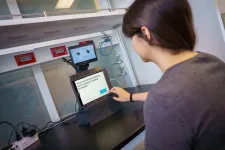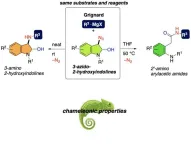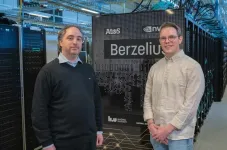(Press-News.org) Video: https://youtu.be/bGKA32TlVXM?si=0PdhaUyOKH33DFbB
Meet CARMEN, short for Cognitively Assistive Robot for Motivation and Neurorehabilitation–a small, tabletop robot designed to help people with mild cognitive impairment (MCI) learn skills to improve memory, attention, and executive functioning at home.
Unlike other robots in this space, CARMEN was developed by the research team at the University of California San Diego in collaboration with clinicians, people with MCI, and their care partners. To the best of the researchers’ knowledge, CARMEN is also the only robot that teaches compensatory cognitive strategies to help improve memory and executive function.
“We wanted to make sure we were providing meaningful and practical inventions,” said Laurel Riek, a professor of computer science and emergency medicine at UC San Diego and the work’s senior author.
MCI is an in-between stage between typical aging and dementia. It affects various areas of cognitive functioning, including memory, attention, and executive functioning. About 20% of individuals over 65 have the condition, with up to 15% transitioning to dementia each year. Existing pharmacological treatments have not been able to slow or prevent this evolution, but behavioral treatments can help.
Researchers programmed CARMEN to deliver a series of simple cognitive training exercises. For example, the robot can teach participants to create routine places to leave important objects, such as keys; or learn note taking strategies to remember important things. CARMEN does this through interactive games and activities.
The research team designed CARMEN with a clear set of criteria in mind. It is important that people can use the robot independently, without clinician or researcher supervision. For this reason, CARMEN had to be plug and play, without many moving parts that require maintenance. The robot also has to be able to function with limited access to the internet, as many people do not have access to reliable connectivity. CARMEN needs to be able to function over a long period of time. The robot also has to be able to communicate clearly with users; express compassion and empathy for a person’s situation; and provide breaks after challenging tasks to help sustain engagement.
Researchers deployed CARMEN for a week in the homes of several people with MCI, who then engaged in multiple tasks with the robot, such as identifying routine places to leave household items so they don’t get lost, and placing tasks on a calendar so they won’t be forgotten. Researchers also deployed the robot in the homes of several clinicians with experience working with people with MCI. Both groups of participants completed questionnaires and interviews before and after the week-long deployments.
After the week with CARMEN, participants with MCI reported trying strategies and behaviors that they previously had written off as impossible. All participants reported that using the robot was easy. Two out of the three participants found the activities easy to understand, but one of the users struggled. All said they wanted more interaction with the robot.
“We found that CARMEN gave participants confidence to use cognitive strategies in their everyday life, and participants saw opportunities for CARMEN to exhibit greater levels of autonomy or be used for other applications,” the researchers write.
The research team presented their findings at the ACM/IEEE Human Robot Interaction (HRI) conference in March 2024, where they received a best paper award nomination.
Next steps
Next steps include deploying the robot in a larger number of homes.
Researchers also plan to give CARMEN the ability to have conversations with users, with an emphasis on preserving privacy when these conversations happen. This is both an accessibility issue (as some users might not have the fine motor skills necessary to interact with CARMEN's touch screen), as well as because most people expect to be able to have conversations with systems in their homes. At the same time, researchers want to limit how much information CARMEN can give users. “We want to be mindful that the user still needs to do the bulk of the work, so the robot can only assist and not give too many hints,” Riek said.
Researchers are also exploring how CARMEN could assist users with other conditions, such as ADHD.
The UC San Diego team built CARMEN based on the FLEXI robot from the University of Washington. But they made substantial changes to its hardware, and wrote all its software from scratch. Researchers used ROS for the robot’s operating system.
Many elements of the project are available at https://github.com/UCSD-RHC-Lab/CARMEN
CARMEN: A Cognitively Assistive Robot for Personalized Neurorehabilitation at Home
Anya Bouzida*, Alyssa Kubota*, Dagoberto Cruz-Sandoval, Elizabeth W. Twamley, and Laurel D. Riek. 2024. CARMEN: A Cognitively Assistive Robot for Personalized Neurorehabilitation at Home. In Proceedings of the 2024 ACM/IEEE International Conference on Human-Robot Interaction (HRI '24). Association for Computing Machinery, New York, NY, USA, 55–64.
https://doi.org/10.1145/3610977.3634971
END
Meet CARMEN, a robot that helps people with mild cognitive impairment
CARMEN teaches strategies to help improve memory and executive function
2024-06-24
ELSE PRESS RELEASES FROM THIS DATE:
NYU creates Center for Mind, Ethics, and Policy
2024-06-24
New York University has established the Center for Mind, Ethics, and Policy, which aims to further our understanding of the sentience and moral status of nonhumans, notably animals and AI systems.
“The world contains quintillions of animals, and in the future, it could contain an even larger number of AI systems,” says Jeff Sebo, CMEP’s founding director and a professor in NYU’s Department of Environmental Studies. “Human activity is increasingly shaping the lives of these beings, and these trends raise important and difficult questions, such as: Which of these beings are sentient, ...
New mathematical proof helps to solve equations with random components
2024-06-24
Whether it’s physical phenomena, share prices or climate models – many dynamic processes in our world can be described mathematically with the aid of partial differential equations. Thanks to stochastics – an area of mathematics which deals with probabilities – this is even possible when randomness plays a role in these processes. Something researchers have been working on for some decades now are so-called stochastic partial differential equations. Working together with other researchers, Dr. Markus Tempelmayr ...
Researchers awarded $2.78M federal grant to improve rectal cancer treatment with artificial intelligence
2024-06-24
CLEVELAND—With a new five-year, $2.78 million grant from the National Institutes of Health and National Cancer Institute, researchers at Case Western Reserve University(CWRU), Cleveland Clinic and University Hospitals (UH) will use artificial intelligence (AI) to better treat rectal cancer patients.
The American Cancer Society estimates about 46,000 people nationally will be diagnosed this year with rectal cancer—the third most common type of cancer in the digestive system, after colon and pancreatic cancer.
By using AI, the researchers intend to derive specific metrics on magnetic resonance imaging (MRI) scans to better understand how ...
Manipulating the frequency of terahertz signals through temporal boundaries
2024-06-24
Terahertz technology could help us meet the ever-increasing demand for faster data transfer rates. However, the down-conversion of a terahertz signal to arbitrary lower frequencies is difficult. In a recent study, researchers from Japan have developed a new strategy to up- and down-convert a terahertz signal in a waveguide by dynamically modifying its conductivity using light, creating a temporal boundary. Their findings could pave the way to faster and more efficient optoelectronics and enhanced telecommunications.
As we plunge deeper into the Information Age, the demand for faster data transmission keeps soaring, accentuated by fast progress in fields like deep learning ...
Study links neighborhood violence, lung cancer progression
2024-06-24
CHAMPAIGN, Ill. — Scientists have identified a potential driver of aggressive lung cancer tumors in patients who live in areas with high levels of violent crime. Their study found that stress responses differ between those living in neighborhoods with higher and lower levels of violent crime, and between cancerous and healthy tissues in the same individuals.
The findings are detailed in the journal Cancer Research Communications.
The study was designed to address the higher incidence of lung cancer in Black men than in white men, said University of Illinois Urbana-Champaign ...
Philadelphia social entrepreneurs address root causes of community violence
2024-06-24
PHILADELPHIA, June 24, 2024 — About 80% of an individual’s modifiable health contributors are determined by social and economic factors.[1] Exposure to violence can have detrimental health implications contributing to toxic stress and trauma, mental health illness, substance abuse and an increased risk for heart disease[2].
The American Heart Association, which marked 100 years of service saving lives earlier this month, has distributed $480,000 from the Association’s Bernard J. Tyson Impact Fund to four social ...
Choosing outcomes: new switchable process for synthesizing 3-aminoindolines and 2’-aminoarylacetic acids from same substrate
2024-06-24
Aniline or nitrogen-containing organic molecules like 3-aniline-substituted indoles commonly found in natural products have shown promising results as pharmaceutical contenders. The same goes for moieties such as 2-aminoaryl acetic acid scaffold which forms the fundamental structural motif of nonsteroidal anti-inflammatory drugs such as diclofenac which inhibits COX-2 to relieve pain and inflammation. While there are several ways of synthesizing these molecules individually using different starting materials, can we produce them ...
Doing a skin check? Confidence is key & social media ads may help
2024-06-24
It’s summer and time to enjoy the sunshine. But it’s also important to do so safely. Skin cancer is the most common form of cancer in the United States—and it’s most commonly caused by sun exposure. Research has shown that skin self-awareness and regular skin self-examinations are strongly linked to better treatment outcomes if you receive a skin cancer diagnosis.
As part of an effort to identify effective interventions to increase skin self-examinations and decrease melanoma deaths, faculty ...
Researchers engineer AI path to prevent power outages
2024-06-24
University of Texas at Dallas researchers have developed an artificial intelligence (AI) model that could help electrical grids prevent power outages by automatically rerouting electricity in milliseconds.
The UT Dallas researchers, who collaborated with engineers at the University at Buffalo in New York, demonstrated the automated system in a study published online June 4 in Nature Communications.
The approach is an early example of “self-healing grid” technology, which uses AI to detect and repair problems such as outages ...
International collaboration lays the foundation for future AI for materials
2024-06-24
Artificial intelligence (AI) is accelerating the development of new materials. A prerequisite for AI in materials research is large-scale use and exchange of data on materials, which is facilitated by a broad international standard. A major international collaboration now presents an extended version of the OPTIMADE standard.
New technologies in areas such as energy and sustainability involving for example batteries, solar cells, LED lighting and biodegradable materials require new materials. Many researchers around the world are working to create materials that have not existed before. But there are major challenges in creating materials ...
LAST 30 PRESS RELEASES:
A genetic brake that forms our muscles
CHEST announces first class of certified critical care advanced practice providers awarded CCAPP Designation
Jeonbuk National University researchers develop an innovative prussian-blue based electrode for effective and efficient cesium removal
Self-organization of cell-sized chiral rotating actin rings driven by a chiral myosin
Report: US history polarizes generations, but has potential to unite
Tiny bubbles, big breakthrough: Cracking cancer’s “fortress”
A biological material that becomes stronger when wet could replace plastics
Glacial feast: Seals caught closer to glaciers had fuller stomachs
Get the picture? High-tech, low-cost lens focuses on global consumer markets
Antimicrobial resistance in foodborne bacteria remains a public health concern in Europe
Safer batteries for storing energy at massive scale
How can you rescue a “kidnapped” robot? A new AI system helps the robot regain its sense of location in dynamic, ever-changing environments
Brainwaves of mothers and children synchronize when playing together – even in an acquired language
A holiday to better recovery
Cal Poly’s fifth Climate Solutions Now conference to take place Feb. 23-27
Mask-wearing during COVID-19 linked to reduced air pollution–triggered heart attack risk in Japan
Achieving cross-coupling reactions of fatty amide reduction radicals via iridium-photorelay catalysis and other strategies
Shorter may be sweeter: Study finds 15-second health ads can curb junk food cravings
Family relationships identified in Stone Age graves on Gotland
Effectiveness of exercise to ease osteoarthritis symptoms likely minimal and transient
Cost of copper must rise double to meet basic copper needs
A gel for wounds that won’t heal
Iron, carbon, and the art of toxic cleanup
Organic soil amendments work together to help sandy soils hold water longer, study finds
Hidden carbon in mangrove soils may play a larger role in climate regulation than previously thought
Weight-loss wonder pills prompt scrutiny of key ingredient
Nonprofit leader Diane Dodge to receive 2026 Penn Nursing Renfield Foundation Award for Global Women’s Health
Maternal smoking during pregnancy may be linked to higher blood pressure in children, NIH study finds
New Lund model aims to shorten the path to life-saving cell and gene therapies
Researchers create ultra-stretchable, liquid-repellent materials via laser ablation
[Press-News.org] Meet CARMEN, a robot that helps people with mild cognitive impairmentCARMEN teaches strategies to help improve memory and executive function









